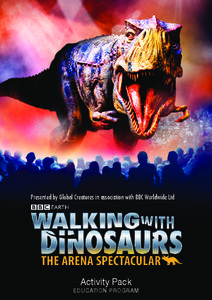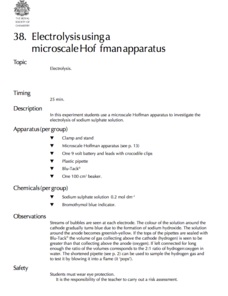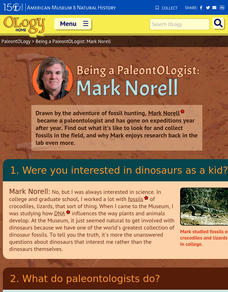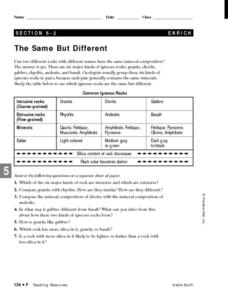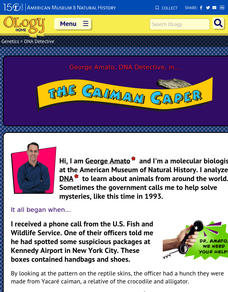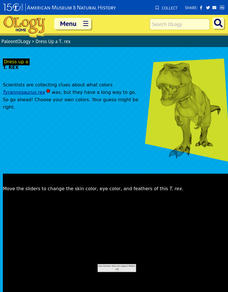BBC
Walking with Dinosaurs
Breath new life into your class's study of dinosaurs with this extensive collection of materials. Offering everything from a printable T-rex mask, word searches, and connect-the-dots activities to informational handouts, hands-on...
Curated OER
Internet Fact Hunt at the "Fact Monster" Web Site- April #4
In this Internet fact hunt instructional activity, students access the "Fact Monster" web site to answer 5 multiple choice questions. They answer science, weather, sports, and invention questions.
Royal Society of Chemistry
Electrolysis Using a Microscale Hoffman Apparatus—Microscale Chemistry
Get big results out of a small-scale lab! Young chemists observe the electrolysis of sodium sulfate using a microscale experiment. A colorful indicator solution combined with the production of gas bubbles yields a variety of observations...
American Museum of Natural History
Being a Paleontologist: Mark Norell
Get to know paleontologist Mark Norell with a 19 question interview. Written questions, answers, and photographs with descriptions sit among bright and cheery graphics
Curated OER
Big Arky, A Real Arkansas Monster
Middle schoolers examine the world of the Arkansas alligator and topics that are related to wetland environments. They pay attention to the relationship between geography, climate, environment, and the animals who live there. A role-play...
Curated OER
The Same, But Different
Third graders examine the phase change between solids and liquids and determine it to be a physical change. Ice is the perfect item to use to demonstrate this phase change. Pupils experiment with measuring and weighing solid ice and the...
Curated OER
Turtle and Tortoise Preschool Lesson Plan
One of the best parts about teaching the littlest learners is that you can create thematic lessons that use one topic to address every subject. Here is a nice set of thematic teaching ideas that uses turtles and tortoises to teach...
LABScI
Circuits Lab: Lightbulbs
Electrons flow from negative to positive, but the general consensus is that current flows from positive to negative. Scholars explore current through construction of circuits in both series and parallel. The focus is on voltage,...
Alliance Theater
The Jungle Book Post-Show STEAM Lesson
An ecosystem is really just the flow of energy through many different living organisms. A study of Rudyard Kipling's The Jungle Book leads to an environmental science activity in which learners study how various factors can affect...
American Museum of Natural History
DNA Detective
DNA is like the fingerprint of genetics. A quick lesson introduces the topic of DNA sequences with a mystery about an endangered species. The lesson shows how DNA extraction, replication, and sequencing often provide undeniable evidence...
American Museum of Natural History
The Tree of Life
Groups of species can have more in common than meets the eye. An interactive cladogram shows some of the connections between important groups of species. Learners click on sections of the diagram to learn more about the connections or on...
American Museum of Natural History
DNA Detective
Match up the DNA code. Pupils read the website from the American Museum of Natural History about how DNA can determine whether a skin is from a particular type of reptile. Using the same technique, learners match up products with the...
Curated OER
Reptiles Vocabulary Multiple Choice Activity
In this reptiles vocabulary worksheet, students complete a ten question multiple choice activity pertaining to reptiles. Students read the questions and choose the correct answer from four choices.
Curated OER
Reptiles Vocabulary
In this reptiles worksheet, students read 11 definitions and match them to the correct vocabulary words in a word box. Students write the reptile vocabulary words in front of each definition.
American Museum of Natural History
Dress up a T. Rex
Scholars play with an image's color and brightness to predict how tyrannosaurus rex's skin, feathers, and eyes would have appeared. Information and real-world pictures shed light on what evidence guides our assumption of how a dinosaur...
Curated OER
Animals in the Media
Sure to activate young minds, this resource asks learners to consider how media influences their personal points of view. Pupils examine how animals are portrayed in the media to understand why they feel the way they do about those...
Curated OER
Mapping Where Animals Live
What type of reptiles live in New York State? This lesson gets the class thinking about what factors determine where particular animals live. They analyze the Hudson Valley environment, identify specific reptile and amphibian...
Curated OER
Mammal Mobile
Short but sweet. Younger learners will view images and hear about the characteristics that make-up mammals, they will then discuss why a particular animal is, or is not, a mammal providing specific details. They will then create a mammal...
Curated OER
Deadly Stingrays!
Learners read a story called Irwin's Death Draws Attention to Stingrays and answer vocabulary and comprehension questions about it. In this stingray lesson plan, student respond to literature by answering questions, recalling details,...
Curated OER
Academic Raceway: Animals
This animals PowerPoint provides a race car game in which students answer a variety of questions about animals, the majority of which are based on ways in which animals adapt to their surroundings and behave to survive.
Curated OER
Power Point Lesson Plan
Students create a multimedia animal research presentation based on the include criteria for both information and sideshow format. They follow directions on slide set-up from creating a slide to transitions and musical insertion.
Curated OER
Zoo Vet
Learners come up with a list of all the animals that might be found in a zoo. They think of all the things that a zoo needs to do and provide for each animal. They discuss what the role of any zoo should be. They design a healthy zoo...
Curated OER
What Makes a Dinosaur a Dinosaur?
Students explore dinosaur stance and the dinosaur-bird connection. They investigate what distinguishes dinosaurs from other reptiles? Students discuss how dinosaurs stand their legs positioned directly under their bodies. They are...
Curated OER
Amazing Australia (Grade K)
Students listen as the teacher reads "Possum Magic" to them. They watch the movie of the book, and create a T graph illustrating the differences and similarities between the book and movie. They research an animal and print a picture in...
Other popular searches
- Crocodiles and Alligators
- Enormous Crocodile
- Books the Enormous Crocodile
- Crocodiles Issues
- The Enormous Crocodile
- Counting Crocodiles
- The Selfish Crocodile
- Crocodiles Facts
- Selfish Crocodile
- Crocodile Beat
- Pictures of Crocodiles
- Crocodiles Muscular System


